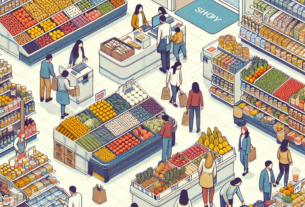The State of the Foodservice Industry in 2025
The foodservice industry is constantly evolving, with new trends, challenges, and innovations shaping the way people dine out. In 2025, one of the key drivers of change in the industry is big data. Big data is revolutionizing the way restaurants and foodservice providers interact with their customers, offering personalized dining experiences that cater to individual preferences and needs.
What is Big Data?
Big data refers to the massive amount of data generated by various sources, including social media, online reviews, loyalty programs, and point-of-sale systems. This data is then analyzed using advanced analytics tools to extract valuable insights that can help businesses make informed decisions and improve their operations.
How Big Data is Driving Personalized Dining Experiences
One of the ways big data is transforming the foodservice industry is by enabling restaurants to create personalized dining experiences for their customers. By analyzing customer data, such as purchase history, preferences, and feedback, restaurants can tailor their menus, promotions, and services to meet the individual needs of each customer.
For example, a restaurant may use big data to identify a customer’s favorite dishes and offer personalized recommendations based on their past orders. They can also send targeted promotions and discounts to customers who have shown a preference for certain types of cuisine or dining experiences.
Benefits of Personalized Dining Experiences
Personalized dining experiences offer a range of benefits for both customers and businesses. For customers, personalized recommendations can enhance their dining experience by helping them discover new dishes, receive relevant promotions, and feel valued by the restaurant. For businesses, personalized dining experiences can lead to increased customer loyalty, higher sales, and improved customer satisfaction.
Case Study: Restaurant X
Restaurant X is a fine dining establishment that has embraced big data to drive personalized dining experiences for its customers. By analyzing customer data collected through their loyalty program and online reservation system, Restaurant X is able to create customized menus for repeat customers, offer personalized wine pairings, and send targeted promotions to customers celebrating special occasions.
As a result of their personalized approach, Restaurant X has seen a significant increase in customer retention and average spend per visit. Customers appreciate the personalized touch and are more likely to return to Restaurant X for future dining experiences.
Challenges and Considerations
While big data offers numerous benefits for the foodservice industry, there are also challenges and considerations that businesses must address when implementing personalized dining experiences. One of the key challenges is data privacy and security, as restaurants must ensure that customer data is collected and stored in compliance with regulations such as GDPR.
Additionally, businesses must invest in the right technology and talent to effectively analyze and utilize big data. This may require training staff on data analytics tools, hiring data scientists, or partnering with third-party providers to access the necessary expertise.
Future Trends and Innovations
Looking ahead, the future of personalized dining experiences in the foodservice industry is bright. As technology continues to advance, restaurants will have access to even more sophisticated tools and algorithms to analyze customer data and deliver personalized recommendations in real-time.
Some future trends and innovations to watch out for include AI-powered chatbots that can interact with customers to gather feedback and preferences, virtual reality dining experiences that allow customers to preview dishes before ordering, and blockchain technology that enables secure and transparent sharing of customer data between restaurants and partners.
In conclusion, big data is driving personalized dining experiences in the foodservice industry, offering a wealth of opportunities for businesses to better understand their customers and deliver tailored services. By harnessing the power of big data, restaurants can create memorable dining experiences that keep customers coming back for more.



